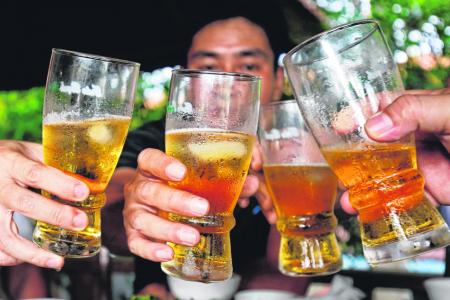Flushed when drinking? There could be cancerous consequences
Redness while drinking could be sign of cancer-causing compound in body
Drinking alcohol is often unavoidable during Chinese New Year. But if you find yourself getting flushed, it might be time to take notice.
The redness might be a sign of deeper health consequences than most realise.
A recent study conducted among over 200 Nanyang Technological University (NTU) students found that more than half of those who drink suffer from the "Asian flush".
The term refers to a genetic predisposition to flushing - usually after alcohol is consumed - that one in three Singaporeans suffers from.
The study also revealed that two-thirds of sufferers are unaware of the causes and consequences of the condition, which includes an increased risk of cancer.
While most Singaporeans might not understand the effects of flushing, many experience the phenomenon.
Mr James Yip, 32, who works in finance, said: "Flushing easily is a major inconvenience for me. I do not drink often or much, but when I do have to, whether at a work function or social event, the redness is quite embarrassing."
He added he often either ignores the flush or declines to drink. When asked what he thinks the cause of the redness is, Mr Yip said, "I do not know, but someone has told me it could be bad circulation or some kind of allergy."
Like Mr Yip, many sufferers do not know the cause of the condition.
Some believe the condition is a sign of good or bad circulation, while others believe that the redness can be "trained" away.
In reality, the redness is caused by a genetic mutation that results in an enzyme deficiency.
Dr Kim Guo Wei, associate consultant in the Division of Surgical Oncology (Upper Gastrointestinal Surgery) at the National University Cancer Institute, said: "Alcohol is metabolised primarily in the liver via two major steps: conversion of alcohol to acetaldehyde and then to acetate. This process is regulated by enzymes."
He said that approximately 40 per cent of East Asians lack one of the enzymes needed to convert acetaldehyde to acetate. He said: "Acetaldehyde is classified as a 'probable human carcinogen' by the US Environmental Protection Agency."
This means the compound is likely to cause cancer in humans.
GASTROINTESTINAL CANCERS
Dr Ong Lizhen, associate consultant in the Department of Laboratory Medicine at the National University Hospital, said: "Patients with the Asian flush condition subject themselves to a higher risk of gastrointestinal cancers should they continue to consume alcohol.
"For example, an Asian flusher who consumes two beers a day is 10 times more likely to develop esophageal cancer, compared with a non-Asian flusher who drinks the same amount."
Dr Kim said: "Studies have shown a strong correlation between Asian flushers and esophageal cancer in particular."
He recommended that the best way to curb this risk is to reduce or stop alcohol consumption, adding that the redness might not necessarily indicate how intoxicated a person is.
He said: "Flushing is due to the rapid accumulation of acetaldehyde and not an indication of drunkenness."
A group of students at NTU's Wee Kim Wee School of Communication and Information designed a campaign cheekily titled "RedAF" to increase awareness of the potential risks associated with the flush and promote healthier and safer drinking habits in Singapore.
The name is a pun on the millennial expression "AF", to stand for both its original meaning of "extremely" - and Asian flush.
"Little local attention has been shed on this issue, and current local drinking campaigns often target the social consequences of drinking, such as drink driving and rowdy behaviour, but not the health effects of excessive drinking", said Ms Lin Si En Rachel, team leader of RedAF, about the importance of such a campaign.
The students are partnering various organisations and will host a booth at the Singapore Cancer Society's Relay for Life community event next month.
Get The New Paper on your phone with the free TNP app. Download from the Apple App Store or Google Play Store now



